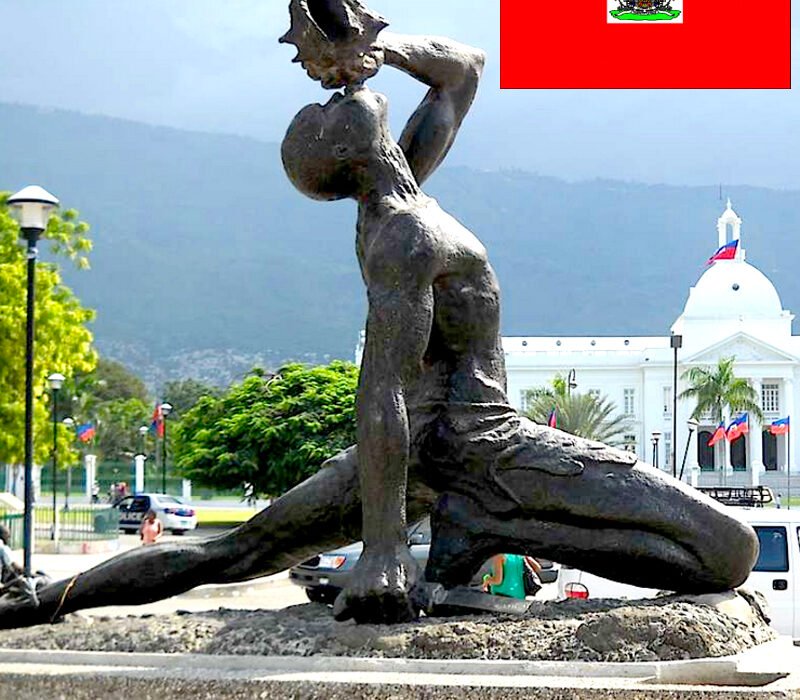It is home to humanity’s most resilient people
Egbert Gaye
In response to US president Donald Trump’s degrading remarks about Haiti and other Black nations, many progressive voices around the world have been raised in defense of the first Black republic in the western hemisphere and what its struggle represents for all people of color, and others involved in the fight for human dignity and justice.
Two hundred and fourteen years after beating back the forces of slavery and repression on the battlefields against the super powers of the day, including France, the United States, Spain and Britain, and planting its flag of independence and freedom, it remains important for the west and others to continue to see Haiti as the poorest nation in the hemisphere.
It’s obvious why it must always be cast as a failed state.
This has nothing to do with the musings of the madman who is president of the United States today.
Poor thing, even though he might stand in the midst of it all, he has very little, if any, understanding of history or the continuing strategy of belittling Haiti and keeping it impoverished.
But it’s too bad that it’s his nasty words that are forcing the eyes of the world back on the beleaguered nation.
The history of Haiti’s distress is well known to those who are interested.
It extends way beyond the 1804 revolution in which the blood of its children were spilled in search of freedom from human bondage, and as such was birthed in pride and dignity of being the only nation to have shaken off the shackles of slavery and stand as an independent state.
For that, the country will continue to pay, as if it has not paid enough.
The fleecing of Haiti that started with France demanding compensation after it was defeated on the battlefield by an army of former slaves has to be the most inhuman punishment in the history of relations between nations.
It was in 1825 that it successfully demanded reparations to the tune of 90 million gold francs for the loss of slaves and property on the island. As mental as it might sound today, its demands were supported and backed by the United States and all of Western Europe.
Poor Haiti, it continued to pay for close to 125 years later. In doing so, sacrificing the well-being of its citizens and consolidating its place as a pariah nation in the eyes of the world.
For those who think that France has done Haiti wrong, take a look at the deeds of the U.S. who early in its history also tasted military defeat at the hands of the soldiers of Haiti.
In 1804, having fought and won its freedom on the battlefields, Haiti’s stance as an independent nation and beacon of hope for liberty and justice for all men was in stark defiance of what the United States represented at the time, and maybe even today.
Professor Hilary Beckles, vice chancellor of the University of The West Indies and a highly acclaimed historian, lays out the moral and socio-political separation between the two nations in a recent response to Trump’s silly ruminations on Haiti.
It’s an amazing take:
The tale of their two constitutions tells this truth. The American Independence Declaration of 2nd July, 1776, reinforced slavery as the national development model for the future. The Haitian Independence Declaration, 1st January, 1804, defined slavery a crime and banished it from its borders. Haiti, then, became the first nation in the world to enforce a provision of personal democratic freedom for all, and did so at a time when America was deepening its slavery roots.
The USA, therefore should daily bow before Haiti and thank it for the lessons it taught in how to conceptualize and create a democratic political and social order. Having built their nation on the pillars of property rights in humans, and realizing a century later that slavery and freedom could not coexist in the same nation, Americans returned to the battlefield to litigate the century’s bloodiest defining and deciding civil war.
Haiti was and will remain this hemisphere’s mother of modern democracy and the Caribbean the cradle of the first ethical civilization. For President Trump, therefore, to define the Caribbean’s noble heroes of human freedom, whose sacrifice was to empower and enlighten his nation in its darkest days as a site of human degradation, is beyond comprehension. It is a brutal bashing of basic truths that are in need, not of violation, but celebration.
From the day Haiti declared its independence to today, its relations with the US was marked by oppression and hatred. Its autonomy was never recognized and, from Day One, it faced sanctions and intimidation from the powerhouse nation of the hemisphere.
Inevitably to consolidate its hold on the beleaguered nation, the US invaded Haiti in 1915 and for almost two decades systematically fleeced the country of what little wealth it accumulated and its plentiful natural resources. And up to today it remains a manipulator of Haiti’s economy and political system, still wielding massive controls over the lives of the Haitian people as was more than obvious with the allegations of massive levels of corruption, mistreatment following the 2010 earthquake.
But hundreds of years of exploitation and denigration at the hands of the world’s most powerful nations together with decades of mismanagement by rogue regimes and leaders, the Haitian people still stand proud.
Again the powerful words of Dr. Beckles tell the story of Haiti:
Haiti, then, is mankind’s monument to its triumphant rise from the demonic descent into despair to the forging of its first democratic dispensation. It is home to humanity’s most resilient people who are the persistent proof of the unrelenting intent of the species to let freedom rain and reign.












